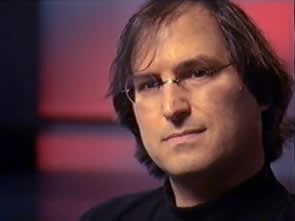
Steve Jobs Dishes On The Tech Business In 'Lost Interview' From 1995 スティーブジョブスがハイテクビジネスについて語る(1995年の幻のインタビューから)
限界を設けない発想、つまり、「出来る」の入口から入り、そのための解決策を追及するという考え方は、まさに「はやぶさ」のJAXAの川口教授が述べられているチームの考えかたと符合する。前人未到を成し遂げる人の発想には通底するものがある。
Categories: Gadgets, Mental Break
November 16, 2011

"We got the number of the Vatican and called the pope," Steve Jobs says of the first project he worked on with Steve Wozniak. Later, the two founded Apple Computer. 「バチカンの電話番号を入手して法王に電話を入れたんだ」とスティーブジョブスはスティーブウォズニアック(後にアップルの共同創業者)との最初のいたずらについて話している。
by BILL CHAPPELL
When he died on Oct. 5, Steve Jobs was eulogized as the tech visionary who put elegantly designed gadgets into the lives of people who often hadn't realized the devices were essential — until Jobs, and Apple, created them. This week, Jobs' admirers will have another chance to hear him speak, thanks to the film Steve Jobs: The Lost Interview.
彼が10月5日に亡くなったとき、スティーブジョブスはビジョナリー(技術の先見性のある人物)として褒め称えられた。 アップルやジョブスが作り出すまで、そのような機器が生活に必須のものとなるとは考えもしなかった皆さんに、彼は洒落たデザインのアイテムをもたらしてくれた。 今週、ジョブスのファンの皆さんは、見つかったスティーブジョブスのインタビュー映像を通して彼のもう一つの話を聞くことができます。 : 題して幻のインタビュー
Only a small portion of the footage, which was once thought to have been lost, has been seen before. Ten minutes of it aired on TV in 1995; in late October, 60 Minutes used excerpts from the tape to flesh out its interview of Walter Isaacson, Jobs' official biographer.
映像のほんの少しの部分(かつて無くなったと思われていた)が以前に見られていた。 1995年にテレビで10分ほどが放映されていた。また10月の末に“60ミニッツ”という番組がジョブスのオフィシャル伝記作家であるウォルター・アイザックソンとのインタビューを肉付けするために、そのテープの抜粋を使用している。
Taped toward the end of Jobs' tenure at NeXT, where he took a nearly 12-year timeout after his ouster from Apple in 1985, the interview was conducted by Robert Cringely, a veteran technology writer and documentary filmmaker, for his PBS show Triumph of the Nerds.
Within two years of the interview, Jobs would return to Apple.
Watching the footage is like seeing a time-capsule version of Jobs, who wears glasses and (what else?) a black mock turtleneck. He is, by turns, playful, defensive and brutally honest — sometimes within the span of one story.
ジョブスのネックスト(NeXT)時代が終わろうとする頃に撮影されたもので、彼がアップルを1985年に追放されて12年ほどたっていた時期にあたる。 インタビューは、ベテランの技術ライターでありドキュメンタリー映像作家であるロバート・クリンゲリーが彼の番組PBSショーの「オタク達の勝利」のなかで放映している。
このインタビューの後二年足らずで、ジョブスはアップルに復帰していることになる。
この映像を見ていると、ジョブスのタイムカプセル版を見ているような気分になる。 眼鏡をかけ(他になにがあったっけ?)黒のモックのタートルネックを着て、時には冗談を交えながら、自己弁護し、そして驚くほどの本音で・・・・その中で話しているからだ。
Jobs' topics include IBM, Xerox, Microsoft and Adobe — in fact, he says, he talked Adobe's founders into developing software instead of hardware.
The master tape of the hourlong interview was lost — but in early October, Cringely's director found some VHS copies of the interview, stashed away in his garage in Britain. On Twitter and his blog, Cringely asked his followers what he should do with the footage.
ジョブスの話題はIBMに始まり、ゼロックス、マイクロソフト、そしてアドビ―へと広がる・・・実際、彼はアドビ―の創業者とハードウェアではなく、ソフトウェアの開発について話したと彼は言っている。
1時間に及ぶインタビューのマスターテープは紛失した・・・・・しかし、10が初旬、グリンゲリーのディレクターがインタビュー番組のVHSのコピーを発見した。英国の彼のガレージにとっておいたのだ。 ツィッターとブログでクリンゲリーは彼のフォロワーに、その映像をどうするかと尋ねたのです。
No one, he says, suggested a theatrical release. But Cringely says he wanted to create "a social experience" for people viewing the interview. For now, it's being given very short runs of between two and three days in about 20 U.S. theaters operated by Landmark.
"The idea came to me late at night so I e-mailed Landmark owner Mark Cuban who replied in five minutes," Cringely writes, "proving insomnia has its virtues."
誰も、劇場公開をアドバイスしてはくれなかったが、クリンゲリーは、そのインタビューを見ている人々のために社会経験を創造してみたかったと思った。 今の所、ランドマークで運営されている約20のUSシアターで2~3日短期上映されている。 「このアイデアは夜中に思いつき、すぐにランドマークのオーナーであるマーク・キューバンにメールしたところ、5分で返事が返ってきました。“不眠症も捨てたものじゃない”」と彼は書いている。
With a running time of a little more than an hour, the documentary is a straightforward affair, showing one camera angle of Jobs, who sits in the museum-like room, with a large monitor in the background. Sitting in front of the camera, Jobs does pretty much what a fan would want him to do: He tells stories, prodded along by Cringely.
1時間を少し上回る上映時間で、そのドキュメンタリーは何の演出もないストレートな内容になっている。大きなモニターを背景に、博物館のような部屋で腰掛けているジョブスのアングルをカメラがとらえている。 カメラの前に腰掛け、ジョブスは、ファンが彼に望むような、まさにその通りに振る舞っている。 彼はクリンゲリーの問いかけに応えるようにして話しを展開している。
Early Project Centers On Phones 電話の悪戯(プロジェクト)の拠点
One of Jobs' stories is about meeting his longtime collaborator Steve Wozniak, when Jobs was around 14 or 15 years old. Wozniak was five years older; he had been kicked out of his first college for playing pranks, Jobs says.
ジョブスの話の一つに、長い間の協力者だったスティーブ・ウォズニアックとの出会いについての話がある。ジョブスが14~15歳の頃である。 ウォズニアックはジョブスより5歳年上で、彼は悪ふざけが過ぎて、最初の大学を退学処分になっていた。
But Jobs also calls Wozniak "the first person I met that knew more about electronics than I did."
The first big project by the men who would go on to found Apple involved two things that, with hindsight, make an elaborate prank seem prescient. Those things were telephones and AT&T.
しかし、ジョブスはウォズニアックのことを「エレクトロニクスについて自分以上に詳しいのは彼が初めてだった。」と話している。
後にアップルを創業する、この二人がやった最初のでかいプロジェクトは、今となってわかることだが、手の込んだいたずらを、あたかも先見の明があるかのように思わせる、二つのことを含んでいた。 それらの事と言うのは電話とAT&Tに関してのことだった。
Jobs and Wozniak were inspired by a story in Esquire about a man named "Captain Crunch," who had built a device that let him make free telephone calls. The idea was to use a device called a Blue Box to mimic the sounds used by phone companies.
ジョブスとウォズニアックはエスカイアの雑誌の“キャプテン・クランチ”と呼ばれる男の記事に触発されていた。彼は電話をただでかける装置を作っていたのだ。 このアイデアは電話会社で使用されている音声周波数を真似るためのブルーボックスと呼ばれる装置に取りいれられることになる。
So in 1971, the two friends hit the library, Jobs says, "looking for the secret tones that would allow you to do this."
そこで、1971年に、この二人は、フリー電話を可能にする秘密の音声周波数(音調)を求めてライブラリーを当たり始めた。
To be precise, the coveted tones were similar to those produced by a touchtone phone — but in a different, and specific, frequency.
もっと正確に言うと、この秘密の音調はプッシュフォンの音と似ていたが、少し違っていた、特に周波数が異なっていた。
"And it turned out that we were at Stanford Linear Accelerator Center one night," Jobs said — and after looking deep in the bowels of the center's technical library, they found a copy of an AT&T technical journal, which contained all they ever wanted to know about the special phone company tones.
「そして、或る夜、とうとう我々はスタンフォード線形加速器センターに行きついた。そしてそのセンターの技術ライブラリーの奥深くにAT&Tの技術資料の写しを見つけたのです。 その資料は我々が知り、たがっていた電話会社の特別音調の全てを載せていました。」とジョブスは語った。
"AT&T made a fatal flaw when they designed... the original digital telephone network," Jobs said. "They put the signaling from computer to computer in the same band as your voice. Which meant that if you could make those same signals, you could put it right in through the handset. And literally, the entire AT&T international phone network would think you were an AT&T computer."
「AT&Tは設計の段階で致命的なミスを犯していました。・・・・デジタル電話ネットワークの原設計で。彼らはコンピュータからコンピュータへの信号を私達の音声と同じ帯域の信号を使用していたのです。其のことは、もし同じ音声信号を電話を通して送ることが出来れば、文字通り、AT&T全体の国際電話通信網は、それをAT&Tのコンピュータと判断するのです。」
It took Jobs and Wozniak three weeks to make their first box. And then they made their first long-distance call — "for free!" Jobs said.
最初のボックス(装置)を作るのに、ジョブスとウォズニアックは3週間費やしている。そして、ついに彼らは“ただで”遠距離電話(国際通話)を初めてかけたのです。
With their device in hand, Jobs and Wozniak learned all the codes they needed to route phone calls through cables, networks and satellites.
作り上げたその装置で、ジョブスとウォズニアックはケーブル回線、ネットワーク、そして衛星通信を通す電話呼び出しに必要なコード(暗号)を全て手に入れたのです。
"You could go around the world five or six times," Jobs says, "and then you could call the payphone next door. So, you could shout into the phone, and after about a minute, it would come out the other phone. It was miraculous."
「世界中どこへでも、5回も6回も電話をかけることができました。 そしてお隣の公衆電話にも。だから、電話に向って叫ぶと、およそ1分程度の遅れて他の電話からその声が漏れてきた。それは驚くべきことだった。(世界を1周するため)」とジョブスは話している。
That might not sound like the best use of anyone's time — let alone that of two creative, industrious young men. But Jobs says it's important to remember just how young they were.
そんなことは、いつの時にも望ましい使用例ではないように思える・・・まあ二人の創造性あふれる技術に詳しい若者の二人に止め置かれるべきことだ。 しかし、ジョブスは若気の至りだったと言う。
"What we learned was, that we could build something ourselves — that could control billions of dollars' worth of infrastructure in the world," he said. "That was what we learned, was that us two — you know, we didn't know much — we could build a little thing that could control a giant thing."
「我々がそこで学んだのは、我々がやろうと思えば自分自身で、世界的規模の数十億ドルの価値があるインフラをコントロールすることが出来る何かを生み出せるという確信だった。 そう、我々が学んだことは、たった二人、それもお互いあまり知らない二人が・・・巨大なものを操る小さな装置を作り上げることが出来たという事実だった」と彼は話している。
And the experience led them to take up more projects.
この経験が彼らを更なるプロジェクトへと突き動かしていくことになる。
"I don't think there would ever have been an Apple Computer had there not been blue-boxing," Jobs says — a somewhat jarring thing to hear in 2011, when Apple reigns as one of the world's most valuable companies.
「このブルーボックスでの経験が無かったら、アップルコンピュータは産まれてなかったと思う。」とジュブスは言っている。・・・・・2011年の、アップルが世界で最も企業価値が高い会社として君臨している現在の時点で聞くとちょっと、どうかと思う発言ではある。
The two even put a small logo on the bottom of their blue boxes, Jobs says. It read, "He's got the whole world in his hands."
二人は、このブルーボックスのそこに小さなロゴを書き込んだ。 それは「彼は全世界を手中に収めた。」と書いてある。
And they eventually used their blue box — bragging a bit, Jobs says that it was completely digital, and the best on the market — to make an international prank call to the Vatican.
実際、彼らは、ジョブスが完全にデジタルで、最高のものだと少し自慢している、このブルーボックスを使っている・・・・・・・・そう、バチカンに国際電話を入れたのだ。
With Wozniak doing his best imitation of Henry Kissinger, Jobs said, "We got the number of the Vatican and called the pope."
ウォズニアックはヘンリー・キッシンジャーの声真似を精一杯して「バチカンの電話番号を入手して、法王に電話を入れたんだ。」とジョブスは言った。
Their call went through, and the request from the man claiming to be the U.S. secretary of state began making its way through the hierarchy.
彼等の電話は首尾よく通じて、アメリカの国務長官と称する男(ウォズニアック)の要求は、バチカンの上層部へと伝えられることになる。
"They actually sent someone to wake up the pope," Jobs said, "when finally, we just burst out laughing, and they realized that we weren't Henry Kissinger. So, we never got to talk to the pope. But it was very funny."
「彼らは、法王を起こしに誰かを実際に向かわせたようだった。 そこで我々は我慢できずに笑い出してしまったので、彼らはすぐに、我々がヘンリー・キッシンジャーでないことに気付いた。 だから法王との会談は未遂に終わったけど、それはとても愉快な事だった。」とジョブスは話す。
The Missteps Of Tech Giants 技術系大企業の誤判断
Some of Jobs' harshest words are for companies that gain a monopoly position, but "forget what it means to make great products." He's harsh on the companies — and the people who run them.
ジョブスの手厳しい批判の言葉は、偉大な製品を生み出すことを忘れてしまった、独占の地位を確立している企業等に向けられるが、批判の矛先は会社だけでなく、その経営者にも向かっている。
In those cases, "the people that can make the company more successful are sales and marketing people," Jobs says, "and they end up running the companies" while people tied to product development are shut out of the decision-making process.
それらの会社の場合、「会社を成功に導く人たちというのは、営業とマーケティングの人々でした。 そして、彼らがついに会社を経営するようになってしまった。その一方で製品開発に当たっている人々は意志決定の過程から外されていったのです。」とジョブスは言う。
"The product sensibility, and the product genius that brought them to that monopolistic position, gets rotted out by people running these companies who have no conception of a good product versus a bad product," he says. "They have no conception of the craftsmanship that's required, to take a good idea and turn it into a good product."
「その企業に市場で独占的地位をもたらした、製品に対する感性の鋭い人や、製品開発の天才達が、製品の良し悪しの概念もない会社経営の連中によってダメにされ、外されていく。 このような経営者は、良いアイデアを良い製品へと転換していくのに必要なクラフトンシップ(職人芸)を全く解っていない。」と彼は言っている。
But he's not done there: "And they really have no feeling in their hearts, usually, about wanting to really help the customers."
しかし、彼はそうしなかった。 「彼らは、本当に顧客を助けたいという思いが心の中にないのだ。」
That's a scenario that might give some unwelcome food for thought to investors and fans of Apple, which has lost its most visible, and product-obsessed, innovator.
そうなると話しの流れは、投資家やアップルのファンに、最も目立っていた、製品に拘る革新者(ジョブス)を失った望ましくない考えの元を植え付けたという話になる。
But in this scenario, Jobs is discussing Xerox, where, Jobs says, innovative engineers had invented a template for where the personal computer was going. But Xerox famously failed to capitalize on it — something Jobs blames on the company being run by "toner heads" who were preoccupied by maintaining its printing business, instead of exploiting the possibilities represented by the computer.
しかし、その流れのなかで、ジョブスはゼロックスについて話している。ゼロックスの革新的技術者がパーソナルコンピュータの向かう先について構想を描きだしていたが、ゼロックスは、ご存じの通り、その芽を摘んでしまった。・・・・ジョブスが再三非難することだが、ゼロックスの会社は、コンピュータに代表されるような新たな可能性を広げるのではなく、印刷ビジネスの維持だけに頭が一杯になっている、いわゆる「トナーの売り上げばかりしかない頭脳(トナーヘッド)の持ち主」の連中で経営されていたのだ。
"So, they just grabbed defeat from the greatest victory in the computer industry," Jobs says. "Xerox could have owned the entire computer industry today."
「だから、彼らはコンピュータ産業界で最高の勝利のチャンスを見逃して、負けてしまったのです。」
"But anyway, that's all ancient history," Jobs adds. "It doesn't really matter anymore."
「しかし、それはとにかく過ぎてしまった昔のことだ。 それはもう、本当にどうでもよいことだ。」とジョブスは言った。
A Reputation For Design, And Being Demanding デザインの評判と要求の厳しさ
Of course, Jobs' ability to be acerbic and blunt has become part of the lore that has surrounded the late CEO. And the lost tape shows signs of his demanding, design-oriented side, as well — an aspect of his personality that is highlighted by Malcolm Gladwell's recent article for The New Yorker.
もちろん、ジョブスの辛辣で率直過ぎる一種の能力は、この後のCEOを取り囲む伝説の一部になっているが、この失われたビデオは彼の要求の強さと設計サイドに拘る彼の特徴的性格をよく物語っている。・・・ちなみに、ジョブスの人格のある一面は最近の「ニューヨーカー」の記事でマルコム・グラッドウェルが特集している。
Titled "The Tweaker," the article draws from stories and anecdotes in Isaacson's biography — and effectively ensconces Jobs in the hall of fame of inventors and craftsmen that extends back to the early days of the Industrial Revolution.
「ザ・おたく」とのタイトルで、アイザックソンの伝記の物語や逸話の中から記事を書き、産業革命にまで遡った発明者や技術者の著名人の殿堂のなかにジョブスをうまく位置付けている。
Discussing innovators and product craftsmen in the Lost Interview, Jobs stresses the vital role they play in companies.
この“失われたインタビュー映像”の中で、ジョブスは革新者や製品を生み出す技術者について話すなかで、会社において、彼らが演ずる最も重要な役割を強調している。
To illustrate his point, he recalls how difficult it was to produce something that has since become ubiquitous: the mouse. He knew what he wanted. But others at Apple insisted that they couldn't build one for less than $300 — and it would take five years to do it.
彼の言いたいことを具体的に説明するため、ジョブスは、あらゆるところに広まっていくようなもの(遍在性のあるもの)を創り出すことが如何に難しいかを話していた。 例えばマウスだ。 ジョブスは彼自身が欲しい機能を判っていたが、アップルの他の連中は、そういうものは300ドル以上掛かるし、開発に5年は見ないといけないと主張した。
"The problem was that we'd hired a bunch of people from Hewlett-Packard," Jobs said. "And they didn't get this idea. They didn't get it."
「問題は、我々がヒューレットパッカード社から沢山の人を採用していたことだった。彼らには、この発想がなかった。 彼らは全く理解していなかったのです。」とジョブスは話す。
Among their shortcomings, he says, was having "no concept of proportionally spaced fonts" or the mouse.
彼等の欠点は、美しいスペース間隔でバランスのとれたフォントやマウスという発想が全くなかったことだったと彼は言う。
"I finally got fed up," Jobs says. He went to an outside design firm, run by David Kelley. "And in 90 days, we had a mouse we could build for 15 bucks, that was phenomenally reliable," he says.
「僕はうんざりした。」とジョブスは言い。 彼は社外のデイビッド・ケリーのデザイン会社に持ち込み、「90日で、マウスと作り、しかも僅か15ドルしかかからなかった。 それは驚くほど使える代物だった。」と言う。
Of course, thanks in part to Apple's advances in touch-screen and swiping technology, the mouse is now in danger of being made obsolete.
勿論、アップルのタッチスクリーンとスワイプ技術の進歩もあり、マウスは今や時代遅れの危機に瀕している。
For anyone who believes that the many stories about Jobs' obsession with detail, how he edits ideas down to an elegant, and efficient, state, are blustery sales pitches — the Apple co-founder has a rebuttal.
ジョブスの細部への拘りについての多く逸話を信じる人には、如何に彼が、そのアイデアをエレンガントで効率的できちっとしたものにまで煮詰めるかは、彼の大げさなセールストークだというが・・・・これにアップルの共同創業者(ジョブス)は反論している。
He begins by noting that often, the difference between the absolute best things in the world, and similar things that are merely average, isn't very extreme.
彼は、世界中にあるものは、絶対的に最高の物と、同種類の平均的な物との差は実はその差ほど、極端に差がかけ離れているわけではないという話しから始める。
Jobs says that in "most things in life, the difference in dynamic range between 'average' and 'the best' is, at most, 2 to 1." And often, they're only separated by a 20 percent gap, he says.
ジョブスは、人の世の殆どの物事についていえば、並みのものと最高のもののダイナミックレンジ(最少最大比)はせいぜい2対1という。 そして通常、それらの差(ギャップ)はたった20%程度ですと彼は言う。
"In software," Jobs says, "the difference between average and the best is 50 to 1. Maybe 100 to 1. Very few things in life are like this. But what I was lucky enough to spend my life in, is like this."
「それがソフトウェアの世界では、その並みとベストとの差は50対1、多分それ以上100対1になる。 通常の世の中ではこれほど差がでるのは殆ど無い。 しかし、そんな世界に自分の身を置けたのは幸せだったと思う。」とジョブスは話した。
限界を設けない発想、つまり、「出来る」の入口から入り、そのための解決策を追及するという考え方は、まさに「はやぶさ」のJAXAの川口教授が述べられているチームの考えかたと符合する。前人未到を成し遂げる人の発想には通底するものがある。
Categories: Gadgets, Mental Break
November 16, 2011

"We got the number of the Vatican and called the pope," Steve Jobs says of the first project he worked on with Steve Wozniak. Later, the two founded Apple Computer. 「バチカンの電話番号を入手して法王に電話を入れたんだ」とスティーブジョブスはスティーブウォズニアック(後にアップルの共同創業者)との最初のいたずらについて話している。
by BILL CHAPPELL
When he died on Oct. 5, Steve Jobs was eulogized as the tech visionary who put elegantly designed gadgets into the lives of people who often hadn't realized the devices were essential — until Jobs, and Apple, created them. This week, Jobs' admirers will have another chance to hear him speak, thanks to the film Steve Jobs: The Lost Interview.
彼が10月5日に亡くなったとき、スティーブジョブスはビジョナリー(技術の先見性のある人物)として褒め称えられた。 アップルやジョブスが作り出すまで、そのような機器が生活に必須のものとなるとは考えもしなかった皆さんに、彼は洒落たデザインのアイテムをもたらしてくれた。 今週、ジョブスのファンの皆さんは、見つかったスティーブジョブスのインタビュー映像を通して彼のもう一つの話を聞くことができます。 : 題して幻のインタビュー
Only a small portion of the footage, which was once thought to have been lost, has been seen before. Ten minutes of it aired on TV in 1995; in late October, 60 Minutes used excerpts from the tape to flesh out its interview of Walter Isaacson, Jobs' official biographer.
映像のほんの少しの部分(かつて無くなったと思われていた)が以前に見られていた。 1995年にテレビで10分ほどが放映されていた。また10月の末に“60ミニッツ”という番組がジョブスのオフィシャル伝記作家であるウォルター・アイザックソンとのインタビューを肉付けするために、そのテープの抜粋を使用している。
Taped toward the end of Jobs' tenure at NeXT, where he took a nearly 12-year timeout after his ouster from Apple in 1985, the interview was conducted by Robert Cringely, a veteran technology writer and documentary filmmaker, for his PBS show Triumph of the Nerds.
Within two years of the interview, Jobs would return to Apple.
Watching the footage is like seeing a time-capsule version of Jobs, who wears glasses and (what else?) a black mock turtleneck. He is, by turns, playful, defensive and brutally honest — sometimes within the span of one story.
ジョブスのネックスト(NeXT)時代が終わろうとする頃に撮影されたもので、彼がアップルを1985年に追放されて12年ほどたっていた時期にあたる。 インタビューは、ベテランの技術ライターでありドキュメンタリー映像作家であるロバート・クリンゲリーが彼の番組PBSショーの「オタク達の勝利」のなかで放映している。
このインタビューの後二年足らずで、ジョブスはアップルに復帰していることになる。
この映像を見ていると、ジョブスのタイムカプセル版を見ているような気分になる。 眼鏡をかけ(他になにがあったっけ?)黒のモックのタートルネックを着て、時には冗談を交えながら、自己弁護し、そして驚くほどの本音で・・・・その中で話しているからだ。
Jobs' topics include IBM, Xerox, Microsoft and Adobe — in fact, he says, he talked Adobe's founders into developing software instead of hardware.
The master tape of the hourlong interview was lost — but in early October, Cringely's director found some VHS copies of the interview, stashed away in his garage in Britain. On Twitter and his blog, Cringely asked his followers what he should do with the footage.
ジョブスの話題はIBMに始まり、ゼロックス、マイクロソフト、そしてアドビ―へと広がる・・・実際、彼はアドビ―の創業者とハードウェアではなく、ソフトウェアの開発について話したと彼は言っている。
1時間に及ぶインタビューのマスターテープは紛失した・・・・・しかし、10が初旬、グリンゲリーのディレクターがインタビュー番組のVHSのコピーを発見した。英国の彼のガレージにとっておいたのだ。 ツィッターとブログでクリンゲリーは彼のフォロワーに、その映像をどうするかと尋ねたのです。
No one, he says, suggested a theatrical release. But Cringely says he wanted to create "a social experience" for people viewing the interview. For now, it's being given very short runs of between two and three days in about 20 U.S. theaters operated by Landmark.
"The idea came to me late at night so I e-mailed Landmark owner Mark Cuban who replied in five minutes," Cringely writes, "proving insomnia has its virtues."
誰も、劇場公開をアドバイスしてはくれなかったが、クリンゲリーは、そのインタビューを見ている人々のために社会経験を創造してみたかったと思った。 今の所、ランドマークで運営されている約20のUSシアターで2~3日短期上映されている。 「このアイデアは夜中に思いつき、すぐにランドマークのオーナーであるマーク・キューバンにメールしたところ、5分で返事が返ってきました。“不眠症も捨てたものじゃない”」と彼は書いている。
With a running time of a little more than an hour, the documentary is a straightforward affair, showing one camera angle of Jobs, who sits in the museum-like room, with a large monitor in the background. Sitting in front of the camera, Jobs does pretty much what a fan would want him to do: He tells stories, prodded along by Cringely.
1時間を少し上回る上映時間で、そのドキュメンタリーは何の演出もないストレートな内容になっている。大きなモニターを背景に、博物館のような部屋で腰掛けているジョブスのアングルをカメラがとらえている。 カメラの前に腰掛け、ジョブスは、ファンが彼に望むような、まさにその通りに振る舞っている。 彼はクリンゲリーの問いかけに応えるようにして話しを展開している。
Early Project Centers On Phones 電話の悪戯(プロジェクト)の拠点
One of Jobs' stories is about meeting his longtime collaborator Steve Wozniak, when Jobs was around 14 or 15 years old. Wozniak was five years older; he had been kicked out of his first college for playing pranks, Jobs says.
ジョブスの話の一つに、長い間の協力者だったスティーブ・ウォズニアックとの出会いについての話がある。ジョブスが14~15歳の頃である。 ウォズニアックはジョブスより5歳年上で、彼は悪ふざけが過ぎて、最初の大学を退学処分になっていた。
But Jobs also calls Wozniak "the first person I met that knew more about electronics than I did."
The first big project by the men who would go on to found Apple involved two things that, with hindsight, make an elaborate prank seem prescient. Those things were telephones and AT&T.
しかし、ジョブスはウォズニアックのことを「エレクトロニクスについて自分以上に詳しいのは彼が初めてだった。」と話している。
後にアップルを創業する、この二人がやった最初のでかいプロジェクトは、今となってわかることだが、手の込んだいたずらを、あたかも先見の明があるかのように思わせる、二つのことを含んでいた。 それらの事と言うのは電話とAT&Tに関してのことだった。
Jobs and Wozniak were inspired by a story in Esquire about a man named "Captain Crunch," who had built a device that let him make free telephone calls. The idea was to use a device called a Blue Box to mimic the sounds used by phone companies.
ジョブスとウォズニアックはエスカイアの雑誌の“キャプテン・クランチ”と呼ばれる男の記事に触発されていた。彼は電話をただでかける装置を作っていたのだ。 このアイデアは電話会社で使用されている音声周波数を真似るためのブルーボックスと呼ばれる装置に取りいれられることになる。
So in 1971, the two friends hit the library, Jobs says, "looking for the secret tones that would allow you to do this."
そこで、1971年に、この二人は、フリー電話を可能にする秘密の音声周波数(音調)を求めてライブラリーを当たり始めた。
To be precise, the coveted tones were similar to those produced by a touchtone phone — but in a different, and specific, frequency.
もっと正確に言うと、この秘密の音調はプッシュフォンの音と似ていたが、少し違っていた、特に周波数が異なっていた。
"And it turned out that we were at Stanford Linear Accelerator Center one night," Jobs said — and after looking deep in the bowels of the center's technical library, they found a copy of an AT&T technical journal, which contained all they ever wanted to know about the special phone company tones.
「そして、或る夜、とうとう我々はスタンフォード線形加速器センターに行きついた。そしてそのセンターの技術ライブラリーの奥深くにAT&Tの技術資料の写しを見つけたのです。 その資料は我々が知り、たがっていた電話会社の特別音調の全てを載せていました。」とジョブスは語った。
"AT&T made a fatal flaw when they designed... the original digital telephone network," Jobs said. "They put the signaling from computer to computer in the same band as your voice. Which meant that if you could make those same signals, you could put it right in through the handset. And literally, the entire AT&T international phone network would think you were an AT&T computer."
「AT&Tは設計の段階で致命的なミスを犯していました。・・・・デジタル電話ネットワークの原設計で。彼らはコンピュータからコンピュータへの信号を私達の音声と同じ帯域の信号を使用していたのです。其のことは、もし同じ音声信号を電話を通して送ることが出来れば、文字通り、AT&T全体の国際電話通信網は、それをAT&Tのコンピュータと判断するのです。」
It took Jobs and Wozniak three weeks to make their first box. And then they made their first long-distance call — "for free!" Jobs said.
最初のボックス(装置)を作るのに、ジョブスとウォズニアックは3週間費やしている。そして、ついに彼らは“ただで”遠距離電話(国際通話)を初めてかけたのです。
With their device in hand, Jobs and Wozniak learned all the codes they needed to route phone calls through cables, networks and satellites.
作り上げたその装置で、ジョブスとウォズニアックはケーブル回線、ネットワーク、そして衛星通信を通す電話呼び出しに必要なコード(暗号)を全て手に入れたのです。
"You could go around the world five or six times," Jobs says, "and then you could call the payphone next door. So, you could shout into the phone, and after about a minute, it would come out the other phone. It was miraculous."
「世界中どこへでも、5回も6回も電話をかけることができました。 そしてお隣の公衆電話にも。だから、電話に向って叫ぶと、およそ1分程度の遅れて他の電話からその声が漏れてきた。それは驚くべきことだった。(世界を1周するため)」とジョブスは話している。
That might not sound like the best use of anyone's time — let alone that of two creative, industrious young men. But Jobs says it's important to remember just how young they were.
そんなことは、いつの時にも望ましい使用例ではないように思える・・・まあ二人の創造性あふれる技術に詳しい若者の二人に止め置かれるべきことだ。 しかし、ジョブスは若気の至りだったと言う。
"What we learned was, that we could build something ourselves — that could control billions of dollars' worth of infrastructure in the world," he said. "That was what we learned, was that us two — you know, we didn't know much — we could build a little thing that could control a giant thing."
「我々がそこで学んだのは、我々がやろうと思えば自分自身で、世界的規模の数十億ドルの価値があるインフラをコントロールすることが出来る何かを生み出せるという確信だった。 そう、我々が学んだことは、たった二人、それもお互いあまり知らない二人が・・・巨大なものを操る小さな装置を作り上げることが出来たという事実だった」と彼は話している。
And the experience led them to take up more projects.
この経験が彼らを更なるプロジェクトへと突き動かしていくことになる。
"I don't think there would ever have been an Apple Computer had there not been blue-boxing," Jobs says — a somewhat jarring thing to hear in 2011, when Apple reigns as one of the world's most valuable companies.
「このブルーボックスでの経験が無かったら、アップルコンピュータは産まれてなかったと思う。」とジュブスは言っている。・・・・・2011年の、アップルが世界で最も企業価値が高い会社として君臨している現在の時点で聞くとちょっと、どうかと思う発言ではある。
The two even put a small logo on the bottom of their blue boxes, Jobs says. It read, "He's got the whole world in his hands."
二人は、このブルーボックスのそこに小さなロゴを書き込んだ。 それは「彼は全世界を手中に収めた。」と書いてある。
And they eventually used their blue box — bragging a bit, Jobs says that it was completely digital, and the best on the market — to make an international prank call to the Vatican.
実際、彼らは、ジョブスが完全にデジタルで、最高のものだと少し自慢している、このブルーボックスを使っている・・・・・・・・そう、バチカンに国際電話を入れたのだ。
With Wozniak doing his best imitation of Henry Kissinger, Jobs said, "We got the number of the Vatican and called the pope."
ウォズニアックはヘンリー・キッシンジャーの声真似を精一杯して「バチカンの電話番号を入手して、法王に電話を入れたんだ。」とジョブスは言った。
Their call went through, and the request from the man claiming to be the U.S. secretary of state began making its way through the hierarchy.
彼等の電話は首尾よく通じて、アメリカの国務長官と称する男(ウォズニアック)の要求は、バチカンの上層部へと伝えられることになる。
"They actually sent someone to wake up the pope," Jobs said, "when finally, we just burst out laughing, and they realized that we weren't Henry Kissinger. So, we never got to talk to the pope. But it was very funny."
「彼らは、法王を起こしに誰かを実際に向かわせたようだった。 そこで我々は我慢できずに笑い出してしまったので、彼らはすぐに、我々がヘンリー・キッシンジャーでないことに気付いた。 だから法王との会談は未遂に終わったけど、それはとても愉快な事だった。」とジョブスは話す。
The Missteps Of Tech Giants 技術系大企業の誤判断
Some of Jobs' harshest words are for companies that gain a monopoly position, but "forget what it means to make great products." He's harsh on the companies — and the people who run them.
ジョブスの手厳しい批判の言葉は、偉大な製品を生み出すことを忘れてしまった、独占の地位を確立している企業等に向けられるが、批判の矛先は会社だけでなく、その経営者にも向かっている。
In those cases, "the people that can make the company more successful are sales and marketing people," Jobs says, "and they end up running the companies" while people tied to product development are shut out of the decision-making process.
それらの会社の場合、「会社を成功に導く人たちというのは、営業とマーケティングの人々でした。 そして、彼らがついに会社を経営するようになってしまった。その一方で製品開発に当たっている人々は意志決定の過程から外されていったのです。」とジョブスは言う。
"The product sensibility, and the product genius that brought them to that monopolistic position, gets rotted out by people running these companies who have no conception of a good product versus a bad product," he says. "They have no conception of the craftsmanship that's required, to take a good idea and turn it into a good product."
「その企業に市場で独占的地位をもたらした、製品に対する感性の鋭い人や、製品開発の天才達が、製品の良し悪しの概念もない会社経営の連中によってダメにされ、外されていく。 このような経営者は、良いアイデアを良い製品へと転換していくのに必要なクラフトンシップ(職人芸)を全く解っていない。」と彼は言っている。
But he's not done there: "And they really have no feeling in their hearts, usually, about wanting to really help the customers."
しかし、彼はそうしなかった。 「彼らは、本当に顧客を助けたいという思いが心の中にないのだ。」
That's a scenario that might give some unwelcome food for thought to investors and fans of Apple, which has lost its most visible, and product-obsessed, innovator.
そうなると話しの流れは、投資家やアップルのファンに、最も目立っていた、製品に拘る革新者(ジョブス)を失った望ましくない考えの元を植え付けたという話になる。
But in this scenario, Jobs is discussing Xerox, where, Jobs says, innovative engineers had invented a template for where the personal computer was going. But Xerox famously failed to capitalize on it — something Jobs blames on the company being run by "toner heads" who were preoccupied by maintaining its printing business, instead of exploiting the possibilities represented by the computer.
しかし、その流れのなかで、ジョブスはゼロックスについて話している。ゼロックスの革新的技術者がパーソナルコンピュータの向かう先について構想を描きだしていたが、ゼロックスは、ご存じの通り、その芽を摘んでしまった。・・・・ジョブスが再三非難することだが、ゼロックスの会社は、コンピュータに代表されるような新たな可能性を広げるのではなく、印刷ビジネスの維持だけに頭が一杯になっている、いわゆる「トナーの売り上げばかりしかない頭脳(トナーヘッド)の持ち主」の連中で経営されていたのだ。
"So, they just grabbed defeat from the greatest victory in the computer industry," Jobs says. "Xerox could have owned the entire computer industry today."
「だから、彼らはコンピュータ産業界で最高の勝利のチャンスを見逃して、負けてしまったのです。」
"But anyway, that's all ancient history," Jobs adds. "It doesn't really matter anymore."
「しかし、それはとにかく過ぎてしまった昔のことだ。 それはもう、本当にどうでもよいことだ。」とジョブスは言った。
A Reputation For Design, And Being Demanding デザインの評判と要求の厳しさ
Of course, Jobs' ability to be acerbic and blunt has become part of the lore that has surrounded the late CEO. And the lost tape shows signs of his demanding, design-oriented side, as well — an aspect of his personality that is highlighted by Malcolm Gladwell's recent article for The New Yorker.
もちろん、ジョブスの辛辣で率直過ぎる一種の能力は、この後のCEOを取り囲む伝説の一部になっているが、この失われたビデオは彼の要求の強さと設計サイドに拘る彼の特徴的性格をよく物語っている。・・・ちなみに、ジョブスの人格のある一面は最近の「ニューヨーカー」の記事でマルコム・グラッドウェルが特集している。
Titled "The Tweaker," the article draws from stories and anecdotes in Isaacson's biography — and effectively ensconces Jobs in the hall of fame of inventors and craftsmen that extends back to the early days of the Industrial Revolution.
「ザ・おたく」とのタイトルで、アイザックソンの伝記の物語や逸話の中から記事を書き、産業革命にまで遡った発明者や技術者の著名人の殿堂のなかにジョブスをうまく位置付けている。
Discussing innovators and product craftsmen in the Lost Interview, Jobs stresses the vital role they play in companies.
この“失われたインタビュー映像”の中で、ジョブスは革新者や製品を生み出す技術者について話すなかで、会社において、彼らが演ずる最も重要な役割を強調している。
To illustrate his point, he recalls how difficult it was to produce something that has since become ubiquitous: the mouse. He knew what he wanted. But others at Apple insisted that they couldn't build one for less than $300 — and it would take five years to do it.
彼の言いたいことを具体的に説明するため、ジョブスは、あらゆるところに広まっていくようなもの(遍在性のあるもの)を創り出すことが如何に難しいかを話していた。 例えばマウスだ。 ジョブスは彼自身が欲しい機能を判っていたが、アップルの他の連中は、そういうものは300ドル以上掛かるし、開発に5年は見ないといけないと主張した。
"The problem was that we'd hired a bunch of people from Hewlett-Packard," Jobs said. "And they didn't get this idea. They didn't get it."
「問題は、我々がヒューレットパッカード社から沢山の人を採用していたことだった。彼らには、この発想がなかった。 彼らは全く理解していなかったのです。」とジョブスは話す。
Among their shortcomings, he says, was having "no concept of proportionally spaced fonts" or the mouse.
彼等の欠点は、美しいスペース間隔でバランスのとれたフォントやマウスという発想が全くなかったことだったと彼は言う。
"I finally got fed up," Jobs says. He went to an outside design firm, run by David Kelley. "And in 90 days, we had a mouse we could build for 15 bucks, that was phenomenally reliable," he says.
「僕はうんざりした。」とジョブスは言い。 彼は社外のデイビッド・ケリーのデザイン会社に持ち込み、「90日で、マウスと作り、しかも僅か15ドルしかかからなかった。 それは驚くほど使える代物だった。」と言う。
Of course, thanks in part to Apple's advances in touch-screen and swiping technology, the mouse is now in danger of being made obsolete.
勿論、アップルのタッチスクリーンとスワイプ技術の進歩もあり、マウスは今や時代遅れの危機に瀕している。
For anyone who believes that the many stories about Jobs' obsession with detail, how he edits ideas down to an elegant, and efficient, state, are blustery sales pitches — the Apple co-founder has a rebuttal.
ジョブスの細部への拘りについての多く逸話を信じる人には、如何に彼が、そのアイデアをエレンガントで効率的できちっとしたものにまで煮詰めるかは、彼の大げさなセールストークだというが・・・・これにアップルの共同創業者(ジョブス)は反論している。
He begins by noting that often, the difference between the absolute best things in the world, and similar things that are merely average, isn't very extreme.
彼は、世界中にあるものは、絶対的に最高の物と、同種類の平均的な物との差は実はその差ほど、極端に差がかけ離れているわけではないという話しから始める。
Jobs says that in "most things in life, the difference in dynamic range between 'average' and 'the best' is, at most, 2 to 1." And often, they're only separated by a 20 percent gap, he says.
ジョブスは、人の世の殆どの物事についていえば、並みのものと最高のもののダイナミックレンジ(最少最大比)はせいぜい2対1という。 そして通常、それらの差(ギャップ)はたった20%程度ですと彼は言う。
"In software," Jobs says, "the difference between average and the best is 50 to 1. Maybe 100 to 1. Very few things in life are like this. But what I was lucky enough to spend my life in, is like this."
「それがソフトウェアの世界では、その並みとベストとの差は50対1、多分それ以上100対1になる。 通常の世の中ではこれほど差がでるのは殆ど無い。 しかし、そんな世界に自分の身を置けたのは幸せだったと思う。」とジョブスは話した。













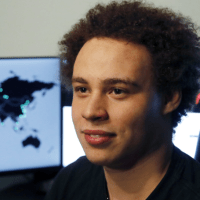



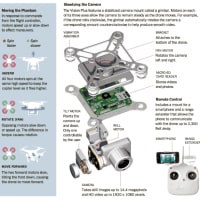
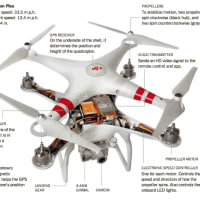
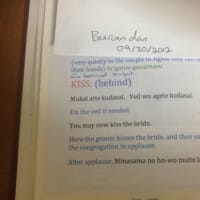
※コメント投稿者のブログIDはブログ作成者のみに通知されます